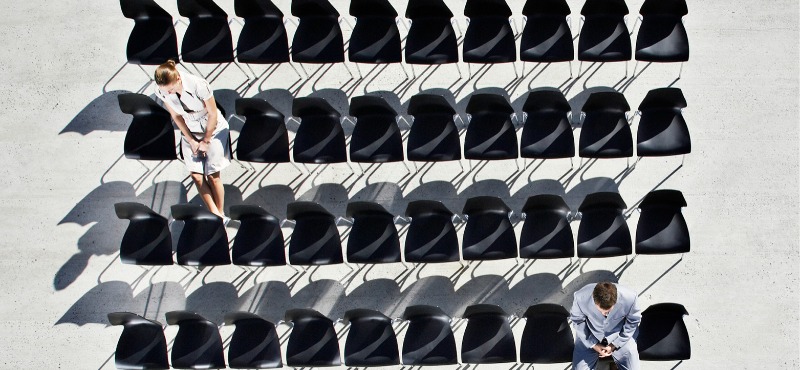When selecting an expert witness, is gender a consideration? In the 21st century, one would hope that we’ve moved past such bias. Attorney Jay Levine, an antitrust attorney who has worked with expert witnesses for nearly 30 years, agrees.
“I’ve never been on a case where the gender of an expert witness was a factor,” he says. “It’s no secret that people try to have a balance of male and female on a trial team so that it’s as diverse as possible to reflect our diverse society.”
“What matters,” he notes, “is if the expert witness can intelligently communicate with the jury. With technical experts, it’s hard sometimes not to talk a lot in technical terms, so the big thing is whether or not the jury clearly understands what the expert witness is describing.”
Levine’s assessment rings true. An experienced expert can take complex topics outside of the layperson’s general understanding–such as the intricacies of high-frequency trading or the fine legal line of financial broker front-running–and clearly articulate the issue so the jury can make a knowledgeable decision.
However, other factors outside of experience and the ability to communicate their expertise may impact an attorney’s selection.
A Pop Culture Example
The idea of gender bias is common, so much that it has been written into the plot of a popular television series.
In a 2005 episode of the television show “Bones,” the main character, Temperance Brennan, a forensic anthropologist, is asked to take the stand as the plaintiff’s expert witness. Prior to her court appearance, the plaintiff’s lawyer and a jury consultant held a coaching session with Brennan.
“I’ve seen you testify before, Dr. Brennan,” the jury consultant says to her. “You come off cold and aloof…it makes you sound arrogant.”
The consultant adds that to contrast Brennen’s seeming arrogance, the defense has hired an “open, charming, great-looking” male expert witness. “The women on the jury aren’t going to be listening to a word that comes out of his mouth. They’re going to be undressing him. I don’t want the men on the jury to be putting more clothes on you. Wear something blue. It suggests truth. Make eye contact with the jury and lose the clunky necklace.”
Real-Life Applications
As biased (and sexist) as this “Bones” example sounds, we assume it’s a fictional story, right? Real-life tracks to TV more closely than you would think. Some female expert witnesses would argue that this exchange is unfortunately very real.
“The idea that expert witnesses should be relatable to the jury is important, particularly with anything that ties to financial analysis,” says Jenna*, a forensic accountant and active expert witness in her field. “In my experience—and I’ve been asked to be a witness for both the prosecution and the defense—there can be a general assumption that having a younger woman, who may be very educated in her field, as an expert witness may result in a softer verdict. The jury can focus on appearance as opposed to the information.”
“There have been times,” she adds, “when I have been personally questioned on my age and attire when addressing large embezzlement cases. I’ve been asked not to wear any jewelry or to not wear a bold-colored lipstick during my testimony. I’ve been asked to answer questions aggressively or with more of a layman’s touch. Sometimes, it is clear that the testimony isn’t about my expertise at all. A large fraud case with embezzlement of a million dollars may be easier to hear from a woman.”
The fact that attorneys use female expert witnesses less than men is also a concern. In the course of her 22-year career on the federal bench, Judge Shira Sheindlin heard from hundreds, if not thousands, of expert witnesses. Of those experts who took the stand, very few were female.
“Most of the doctors who testified to injuries in personal injury cases were men. And most scientists were men. Surely all the economists I saw were men,” Sheindlin told Bloomberg BNA in a 2017 interview. “Unfortunately, I think the lawyers who select experts just assume that a male has more gravitas and will be more convincing to a jury.”
The same Bloomberg article also notes that attorneys tend to choose male expert witnesses 80% of the time, and men are paid approximately 60% more than women in the same role.
But it’s not all doom and gloom for female expert witnesses, Jenna* adds.
“Twenty years ago, I rarely got requests to be an expert witness. I would be consulted on the actual forensic work, but the witness testimony would be provided by a male-dominated pool of people. I’ve seen great strides in this now.”
Today, she says the key to being a great expert witness is believing that the knowledge you are bringing to the table is regardless of gender.
*This expert witness asked to remain anonymous due to the sensitive nature of her profession.
***
Kristin Hackler writes on behalf of GLG Law, a platform that connects lawyers with expert witnesses in complex fields. Kristin was formerly a content writer for an international civil plaintiff’s firm and is also an award-winning ghostwriter. Her ghostwritten works include multiple legal publications, as well as books on entrepreneurship, leadership, and family business.
Reference: Does Gender Play a Role in Selecting Expert Witnesses?
3,306 total views, 1 views today

